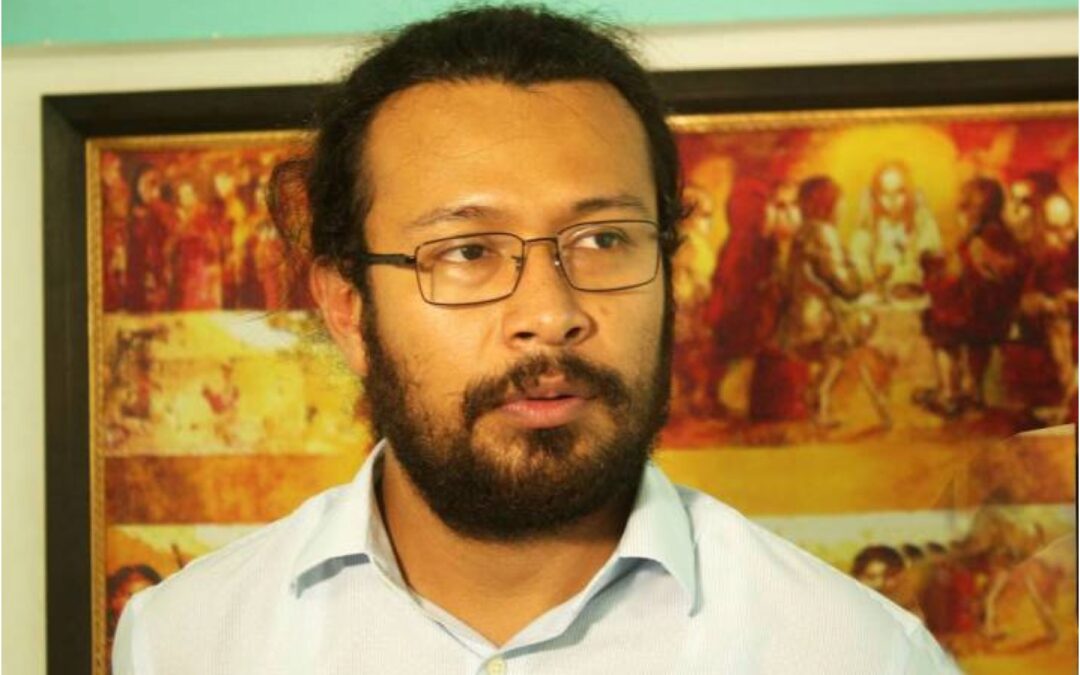
Oct 7, 2019 | Artículos, Noticias
La semana pasada el defensor de derechos humanos Germán Romero Sánchez recibió nuevas amenazas que estarían relacionadas con su labor de abogado defensor de víctimas de graves violaciones a los derechos humanos por parte de agentes estatales
En esta ocasión, las amenazas se realizaron a través de llamadas telefónicas a la residencia del abogado Romero. La primera llamada fue atendida por la compañera del abogado Romero a la cual le dijeron “no te voy a dejar vivo toda la vida, ¿oyo?”. La llamada se produjo minutos después de que el abogado Romero saliera de su casa a llevar a una de sus hijas al colegio.
Esta no es la primera vez que el abogado Romero recibe amenazas por su labor como representante de víctimas y defensor de derechos humanos. Hace menos de un mes, el abogado Romero realizó una denuncia pública dando cuenta de varios hechos de hostigamiento y percusión de los que ha sido víctima él y su familia. Igualmente, en enero de este año, recibió amenazas contra su vida por su labor como abogado defensor de Alfamir Castillo, cuyo hijo fue ejecutado extrajudicialmente por parte de miembros del Ejército Nacional.
El abogado Romero es un reconocido abogado de derechos humanos con más de quince años de experiencia acompañando víctimas de crímenes de Estado. Es uno de los abogados líderes de la organización Asociación Red de Defensores y Defensoras de Derechos Humanos (dhColombia) con la cual la CIJ ha realizado diferentes proyectos en Colombia.
Como lo hizo en oportunidades pasadas, la CIJ vuelve a resaltar la difícil situación de seguridad que atraviesan los defensores de derechos humanos en Colombia. Solo en el año 2018, la Oficina en Colombia de la Alta Comisionada de las Naciones Unidas para los Derechos Humanos reportó el asesinato de 110 personas defensoras de derechos humanos. La CIJ exhorta al Gobierno Nacional y las demás autoridades competentes para que se tomen medidas efectivas que garanticen la seguridad de los defensores de derechos humanos colombianos.
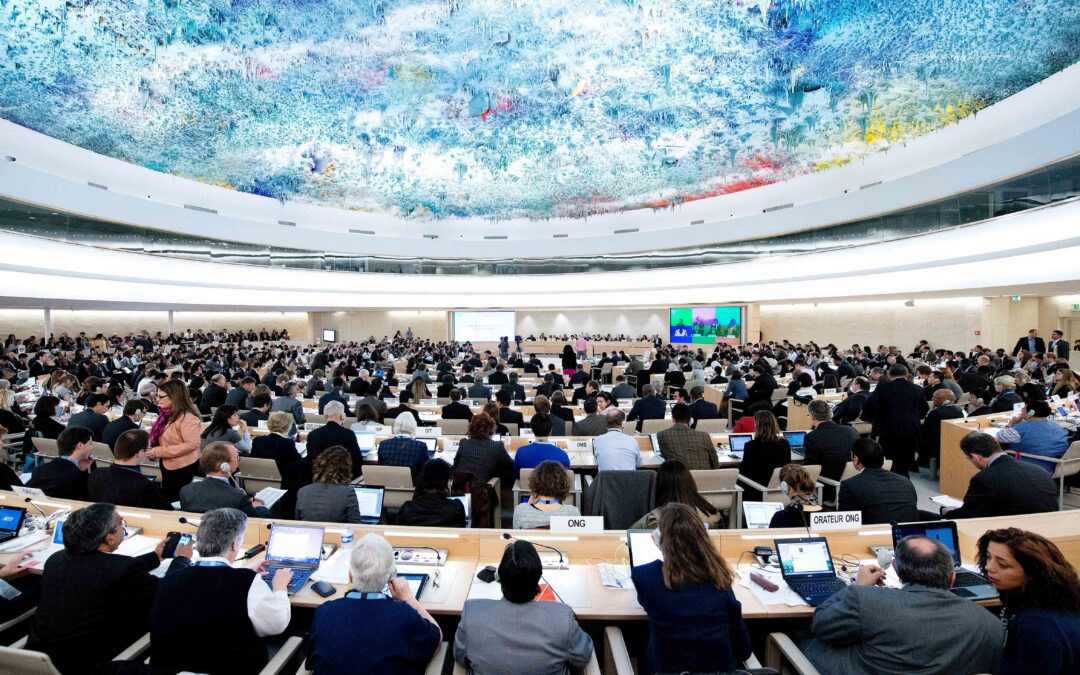
Sep 26, 2019 | Advocacy, Non-legal submissions
The ICJ today highlighted challenges and urged strengthening and support for the Special Jurisdiction for Peace in Colombia, at the UN Human Rights Council in Geneva.
The statement was delivered during a general debate on technical assistance and capacity-building. It read as follows:
“The International Commission of Jurists (ICJ) appreciates the contribution of UN technical assistance and capacity-building to implementation of the Peace Agreement in Colombia.
Full implementation of the Peace Agreement is important to the fulfilment of Colombia’s international human rights obligations, including rights of victims. In particular, the Special Jurisdiction for Peace (JEP by its Spanish acronym) is playing a key role in addressing accountability for gross human rights violations committed during the internal conflict in Colombia.
The JEP faces several challenges.[1] First, the JEP must do more to strengthen effective participation of victims in its procedures. Second, the Special Jurisdiction from the outset should ensure that the sanctions it imposes and reparation measures it orders are sufficient and appropriate to meet international standards. Third, national authorities, including the President and the Parliament, must respect the judicial independence of the Special Jurisdiction.
The ICJ also highlights the need for effective measures to address security threats faced by victims and witnesses appearing before the JEP.
We urge the UN, States and other stakeholders to provide technical assistance and capacity building towards strengthening guarantees for victim’s rights in the JEP’s procedures, and we urge the Human Rights Council to follow closely the work of the Special Jurisdiction for Peace to ensure it makes an effective contribution to fulfilling Colombia’s obligations under international law.”
[1] See also ICJ, Colombia: The Special Jurisdiction for Peace, Analysis One Year and a Half After its Entry into Operation (executive summary in English and full report in Spanish available at: https://www.icj.org/colombia-the-special-jurisdiction-for-peace-one-year-after-icj-analysis/).
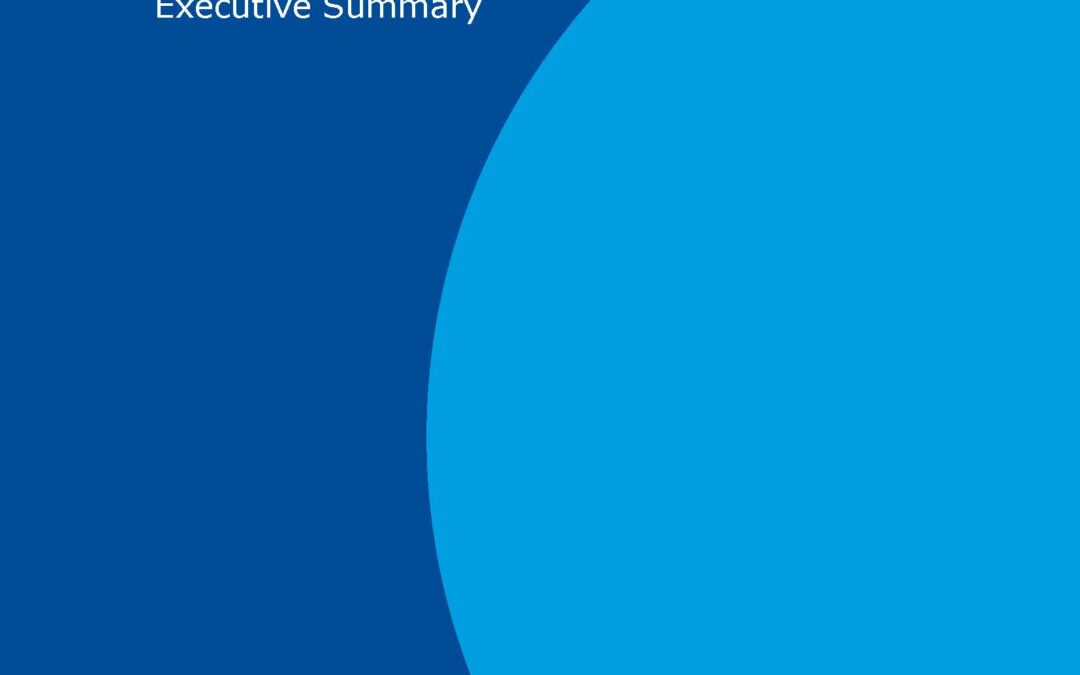
Sep 19, 2019
ICJ’s new report – and its executive summary – on the implementation of the Special Jurisdiction for Peace, are now available in English.
The ICJ, in furtherance of its objective to promote accountability, justice and the rule of law in Colombia, has been continuously monitoring the implementation of the mechanisms and institutions created as a result of the peace negotiations between the Colombian National Government and the Revolutionary Armed Forces of Colombia – People’s Army (FARC-EP).
Among these mechanisms and institutions, the Special Jurisdiction for Peace (JEP in its Spanish acronym) is of particular importance because it is the institution that was designed to investigate, prosecute and punish those responsible for the most serious human rights violations committed during the armed conflict in Colombia.
In June 2019, as a result of its monitoring activities, the ICJ released its report Jurisdicción Especial para la Paz: análisis a un año de su entrada en funcionamiento (Special Jurisdiction for Peace: analysis of its first year since it started functioning). The report presents the advances in the implementation of the JEP, documenting both strengths and challenges. It uses the international human rights framework as a point of reference for the national implementation of transitional justice instruments and mechanisms; and provides a description of Colombian law relevant to the JEP and a detailed analysis of the JEP’s operations and procedures. The report reflects developments up to 7 June 2019.
Considering the importance of improving the understanding of JEP’s work among non-Spanish speakers, the executive summary of the ICJ report is now available in English. The full version of the report will be available in English in the forthcoming months.
Download
Colombia-Jurisd para la paz-PUBLICATIONS-Reports-Fact-finding mission report-2019-ENG (full report in PDF)
Colombia-Jurisd para la paz Exec Summary-PUBLICATIONS-Reports-Fact-finding mission report-2019-ENG (full executive summary in PDF)
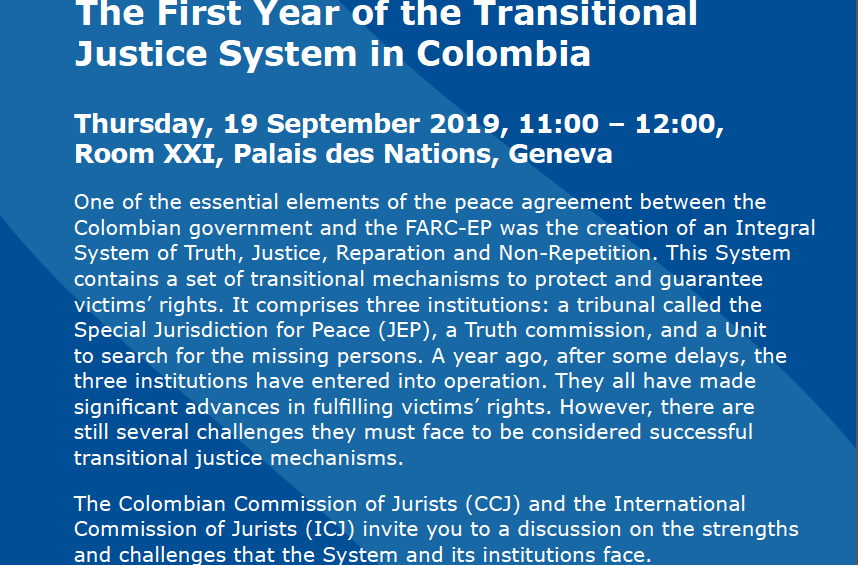
Sep 18, 2019 | Events, News
The Colombian Commission of Jurists (CCJ) and the ICJ invite you to a discussion on the strengths and challenges that the System and its institutions face. The event takes place Thursday, 19 September 2019, at 11:00 – 12:00, room XXI, in the Palais des Nations.
One of the essential elements of the peace agreement between the Colombian government and the FARC-EP was the creation of an Integral System of Truth, Justice, Reparation and Non-Repetition. This System contains a set of transitional mechanisms to protect and guarantee victims’ rights. It comprises three institutions: a tribunal called the Special Jurisdiction for Peace (JEP), a Truth commission, and a Unit to search for the missing persons. A year ago, after some delays, the three institutions have entered into operation. They all have made significant advances in fulfilling victims’ rights. However, there are still several challenges they must face to be considered successful transitional justice mechanisms.
The panel will feature:
Moderator:
- Sam Zarifi, ICJ Secretary General
Speakers:
- Philippe Texier, former judge of the Court of Cassation of France and ICJ commissioner.
- Edinson Cuéllar, Colectivo Sociojurídico Orlando Fals Borda
- Ana María Rodríguez, CCJ Senior Legal Adviser
- Rocío Quintero, ICJ Legal Adviser
Printed copies of the ICJ report “Colombia: Jurisdicción Especial para la Paz, análisis a un año y medio de su entrada en funcionamiento” will be available. (Full version in Spanish and Executive Summary in English)
A flyer for the event is available here.
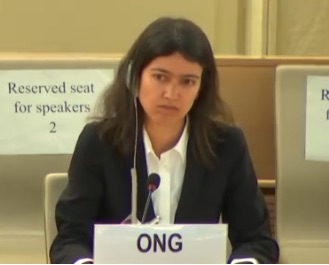
Sep 11, 2019 | Advocacy, Non-legal submissions
The ICJ today reiterated its call for the UN Human Rights Council to establish an international independent Commission of Inquiry on the human rights situation in Venezuela.
The statement, delivered in a general debate at the Council following the oral update by the UN High Commissioner for Human Rights mandated by the previous Human Rights Council resolution on Venezuela, read as follows:
“Mr. President,
The International Commission of Jurists (ICJ) welcomes the High Commissioner for Human Rights’ oral update on the situation in Venezuela.
The update and previous reporting point to a wide range of human rights violations, which continue to occur inside the country. These include arbitrary deprivation of liberty, serious violations of indigenous people’s rights, excessive use of force by security forces and attacks on freedom of expression, among others, as well as the impacts of laws, policies and practices that have adversely affected the independence of the judiciary.
Over the years, the International Commission of Jurists has monitored and documented the lack of judicial independence in Venezuela and the absence of accountability for those responsible for gross human rights violations.
The ICJ urges the Human Rights Council to establish an independent Commission of Inquiry on the human rights situation in Venezuela, given that Venezuelan authorities have been unable or unwilling to pursue effective domestic accountability, and judicial and prosecutorial mechanisms in the country lack independence and impartiality.
The Commission of Inquiry should be mandated to investigate reports of violations of international human rights law in Venezuela, establish the facts and circumstances of violations committed since at least 2014, and identify those responsible with a view to contributing to full accountability for all violations, including those that constitute crimes under international law.
Thank you.”
The oral update of the UN Human Commissioner for Human Rights, on the situation in Venezuela, may be accessed here.
In August 2019, the ICJ joined other NGOs in calling for an international commission of inquiry on Venezuela.
States are expected to discuss a further resolution on Venezuela at the current Human Rights Council session, for adoption on 26 or 27 September.









